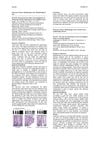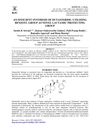 21 citations,
January 1995 in “Journal of the American Institute for Conservation”
21 citations,
January 1995 in “Journal of the American Institute for Conservation” A new method extracts red dyes from wool without damaging it, although it slightly weakens the wool.
 19 citations,
February 2010 in “Journal of Chemical & Engineering Data”
19 citations,
February 2010 in “Journal of Chemical & Engineering Data” Flutamide, dutasteride, and finasteride dissolve differently in supercritical carbon dioxide, with dutasteride dissolving the least.
 18 citations,
April 2001 in “Bioorganic & Medicinal Chemistry Letters”
18 citations,
April 2001 in “Bioorganic & Medicinal Chemistry Letters” The nature of the side chain in RU 58841 derivatives greatly affects its AR affinity, with the N-(iodopropenyl) derivative 13 showing the highest AR binding affinity, suggesting its potential for developing high-affinity radioiodinated AR radioligands.
 17 citations,
January 2010 in “International journal of trichology”
17 citations,
January 2010 in “International journal of trichology” A man experienced hair loss from radiotherapy, which can be temporary or permanent depending on radiation dose, with potential treatments available.
 15 citations,
January 2015 in “Pharmaceutical Biology”
15 citations,
January 2015 in “Pharmaceutical Biology” Chrysanthemum zawadskii extract may be a better treatment for hair loss than Minoxidil.
 15 citations,
July 1991 in “International Journal of Dermatology”
15 citations,
July 1991 in “International Journal of Dermatology” Laser Doppler velocimetry is a valuable noninvasive tool for skin blood flow research in dermatology.
 13 citations,
May 2011 in “Bioorganic & Medicinal Chemistry”
13 citations,
May 2011 in “Bioorganic & Medicinal Chemistry” Changing the 6-position on benzopyran molecules affects insulin release, with some compounds showing strong inhibitory effects.
 12 citations,
March 2019 in “Lasers in Surgery and Medicine”
12 citations,
March 2019 in “Lasers in Surgery and Medicine” Low-level laser therapy improves hair growth and dermal papilla cell function.
 12 citations,
September 2014 in “Journal of Food Science and Nutrition”
12 citations,
September 2014 in “Journal of Food Science and Nutrition” Platycarya strobilacea extract is a strong antioxidant that can grow hair better than minoxidil.
 11 citations,
May 2010 in “Journal of Medicinal Chemistry”
11 citations,
May 2010 in “Journal of Medicinal Chemistry” A new compound was created in 2010 that can control oil production when applied to the skin, and its effects are completely reversible after two weeks.
 10 citations,
September 1997 in “Molecular carcinogenesis”
10 citations,
September 1997 in “Molecular carcinogenesis” Mirex seems to promote a unique group of skin cells different from those affected by another tumor promoter, TPA.
 8 citations,
July 2017 in “The Journal of Steroid Biochemistry and Molecular Biology”
8 citations,
July 2017 in “The Journal of Steroid Biochemistry and Molecular Biology” DHT affects testicular development and regulates spermatogenesis in some fish.
 8 citations,
September 1958 in “Acta pathologica et microbiologica Scandinavica”
8 citations,
September 1958 in “Acta pathologica et microbiologica Scandinavica” Certain treatments can speed up local hair growth in mice but don't change the overall hair growth pattern.
 6 citations,
September 2019 in “Skin pharmacology and physiology”
6 citations,
September 2019 in “Skin pharmacology and physiology” RCS-01 therapy is safe and may improve skin structure by affecting gene expression.
 6 citations,
April 2014 in “European journal of medicinal chemistry”
6 citations,
April 2014 in “European journal of medicinal chemistry” New compounds similar to cromakalim were less effective at inhibiting insulin release but improved in solubility and one acted as a calcium entry blocker, not a potassium channel opener.
 6 citations,
August 1996 in “The Journal of Clinical Endocrinology and Metabolism”
6 citations,
August 1996 in “The Journal of Clinical Endocrinology and Metabolism” MK-386 and finasteride together effectively reduce DHT levels, potentially treating acne and male pattern baldness.
 4 citations,
March 2019 in “Acta Chromatographica”
4 citations,
March 2019 in “Acta Chromatographica” Two methods can measure finasteride and tamsulosin hydrochloride; HPLC is more advantageous, while TLC offers better separation.
 3 citations,
June 2009 in “Journal of The European Academy of Dermatology and Venereology”
3 citations,
June 2009 in “Journal of The European Academy of Dermatology and Venereology” Sparse hairs below frontal hairline can indicate early male balding.
![The Synthesis of (−)-4-Methyl-8-Chloro-Trans-1,2,3,4,4a,5,6,10b-Octahydrobenzo-[f]-Quinolin-3-One-[3-14C] (LY300502-14C) via a Circuitous Route](/images/research/73bab8dc-bdf0-45e3-8ef7-73d0d4b93cb1/small/21074.jpg) 3 citations,
October 1994 in “Journal of Labelled Compounds and Radiopharmaceuticals”
3 citations,
October 1994 in “Journal of Labelled Compounds and Radiopharmaceuticals” Scientists made a carbon-14 labeled version of a drug with a 48% yield and over 99% purity.
 2 citations,
January 2016 in “Scientifica”
2 citations,
January 2016 in “Scientifica” Researchers created a reliable method to measure dexpanthenol and resorcinol in hair products.
 2 citations,
January 2009 in “Journal of Drug Delivery Science and Technology”
2 citations,
January 2009 in “Journal of Drug Delivery Science and Technology” Minoxidil in distearyldimethylammonium chloride vesicles significantly promotes hair growth, while minoxidil in microparticles or poloxamer solutions doesn't.
 2 citations,
February 2004 in “Biopolymers”
2 citations,
February 2004 in “Biopolymers” 4-(4-Phenoxybenzoyl)benzoic acid derivatives can both increase and decrease certain types of reactive oxygen species, and may be relevant to hair loss.

Monocyclic aromatic compounds are important for developing various drugs and treatments.
 January 2020 in “Acta Scientiae Veterinariae”
January 2020 in “Acta Scientiae Veterinariae” A dog's chronic bite wound healed successfully using a mix of herbal gel, low power laser, and ozone therapy.
 April 2018 in “Radiotherapy and Oncology”
April 2018 in “Radiotherapy and Oncology” Mitochondria may influence how cells respond to radiation, affecting nearby non-irradiated cells.
 January 2017 in “Rasayan journal of Chemistry”
January 2017 in “Rasayan journal of Chemistry” Researchers created a new, efficient way to make Dutasteride, a hair loss and prostate drug, with high purity using a benzoyl group.
 February 2015 in “Journal of Biomedical Materials Research Part B: Applied Biomaterials”
February 2015 in “Journal of Biomedical Materials Research Part B: Applied Biomaterials” 4-META resin heals skin wounds faster and better than cyanoacrylate.
 July 2005 in “SKINmed/Skinmed”
July 2005 in “SKINmed/Skinmed” BRL 7660, once studied for male contraception, showed promise as an acne treatment but was not developed further due to competing drugs.
 September 1997 in “JEADV. Journal of the European Academy of Dermatology and Venereology/Journal of the European Academy of Dermatology and Venereology”
September 1997 in “JEADV. Journal of the European Academy of Dermatology and Venereology/Journal of the European Academy of Dermatology and Venereology” Psychological factors play a significant role in developing alopecia areata.
 October 2020 in “Journal of Pharmaceutical Sciences”
October 2020 in “Journal of Pharmaceutical Sciences” Topical finasteride with EGCG or TA improves drug release and dermal uptake, potentially treating hair loss effectively.



















![The Synthesis of (−)-4-Methyl-8-Chloro-Trans-1,2,3,4,4a,5,6,10b-Octahydrobenzo-[f]-Quinolin-3-One-[3-14C] (LY300502-14C) via a Circuitous Route](/images/research/73bab8dc-bdf0-45e3-8ef7-73d0d4b93cb1/small/21074.jpg)










